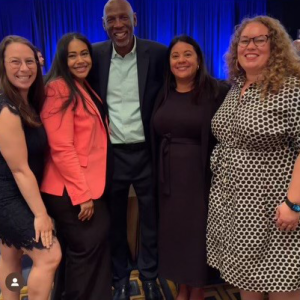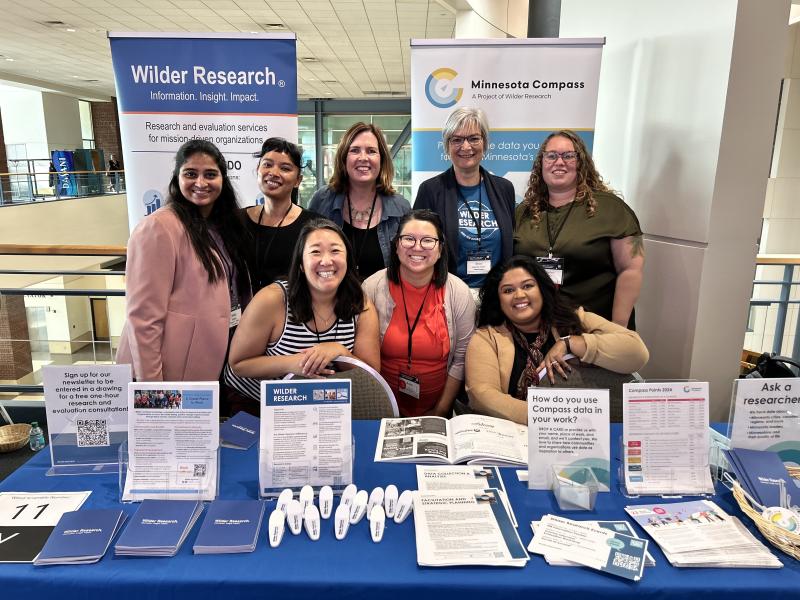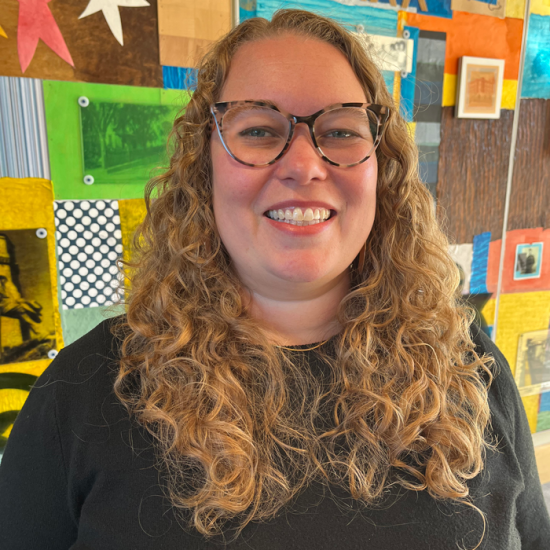Meet the Researcher: Briellen Griffin
What does community engagement in research mean? What does it look like when a research organization is engaging communities authentically?
These are just a few of the questions Briellen Griffin gets asked about her role as Community Engagement and Partnership Manager at Wilder Research.
Get to know Brie, her views on community engagement, and what brings her joy in the work … in her own words.
What are your priorities in your new role as Community Engagement and Partnership Manager?
The focus of my role is to facilitate a coordinated approach to community partnership and engagement across Wilder Research. We have a long history of working to center community in our work and we are accountable to community for the ways that we show up.
My priorities this year focus on building staff capacity and strengthening our partnership with other Wilder Foundation divisions and programs. I am also taking time to learn from our community partners about how we can be a trusted collaborator and I am seeking opportunities to pull community closer. My goal is that we deepen our engagement across the foundation, grow the footprint of community engagement, and develop Wilder Research as a leader in community engagement and partnership over time.
Can you explain your research?
My work as a researcher focuses on addressing systematic inequities in our society and understanding how collective, cross-sector collaboration can lead to sustainable solutions. Much of my research and evaluation has focused on education and well-being across the lifespan, and all of my work engages race and culture as keys to understanding most problems that we face and the solutions we need to solve those problems.
As a Black woman researcher, I bring a lens to my work that is underrepresented in research and evaluation. That lens recognizes that community cultural wealth and knowledge are foundational to understanding problems and creating solutions.
What brought you to this work?

Research and evaluation are personal for me. I was raised to really believe in the value of education as a tool for liberation, an idea that is fundamentally important in the Black community, as in others. I grew up as a light-skinned, multiracial Black kid with blond hair and blue eyes, and I was treated differently than other Black kids at school. I loved school and really thrived there, and it bothered me that I got preferential treatment from adults. By the time I was in high school, I was pretty sure that I wanted to work in education, to make sure that school was a positive experience for all students.
Ultimately, this same desire led me back to graduate school so that I could study more about how schools reproduce racial inequalities, and to explore liberatory and humanizing possibilities for education. On that road, I realized that research and evaluation were also tools that I could use and skills I could hone to support the beautiful work that is happening in our communities. I am grateful to be able to support community through our work at Wilder Research and build lasting partnerships that will lead to real social change.
What do you want everyone who works with you on a research project to know?
One of the best things about my current role is being able to provide consultation and support on all kinds of projects. Wilder Research has partnerships and projects across so many social issues – housing and homelessness, education and family support – the list is long! With a focus on community engagement and partnership, I am able to help all Wilder Research staff (more than 75!) explore how to center community in their work. I enjoy being a connector and a bridge-builder, but I also love to step back and watch those partnerships grow. I am always here to consult and provide guidance, and I know I am doing my job well when partnerships don’t require my involvement to be sustained.

What brings you joy in your research?
Learning from others brings me joy. Seeing hard work come to fruition brings me joy. Collaborating brings me joy. I often put pressure on myself because I want to make my community proud and I want to be of service. What I have been learning is that there is a lot of joy in that process of being in community to make good things happen. And it reminds me that it’s not all on me. We are not alone!
Favorite research method and why?
In terms of research methods, I am a critical, qualitative methodologist, through and through. What that means is that I believe that we have to ask questions of the social world, and interrogate inequities – we don’t have to accept that the world is unjust. I focus on qualitative methods because I do my best work when I am engaging with people and communities. Qualitative methods are creative and people-centered, and they allow us to name and claim our complex identities and how those identities inform our worldview.
Learn more about Brie
Meet the Researcher introduces you to the smarties that make Wilder Research tick. Wilder’s research team brings a wide array of knowledge and experiences that inform their work. Find out why they are drawn to research and evaluation with community organizations and where they find joy in research.
